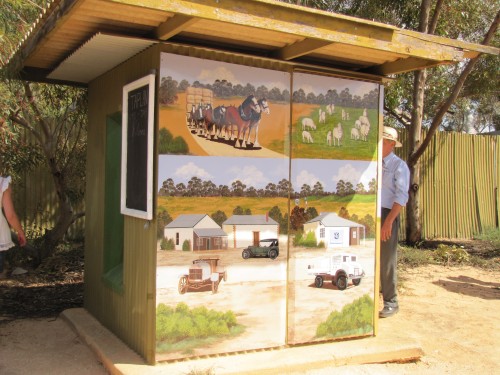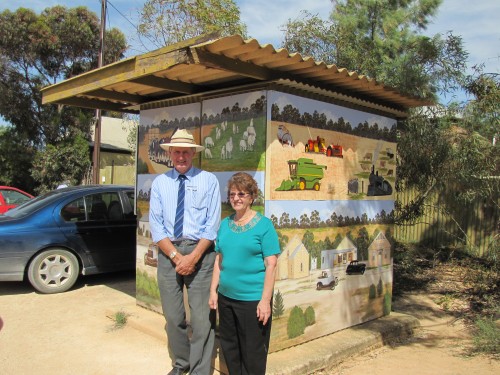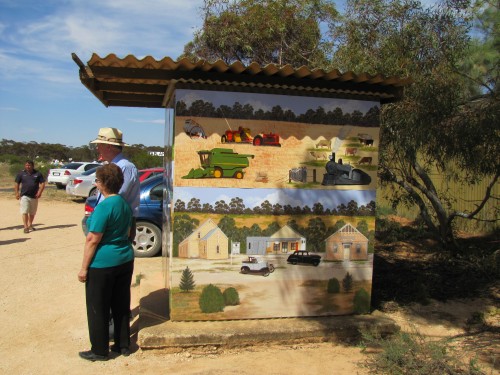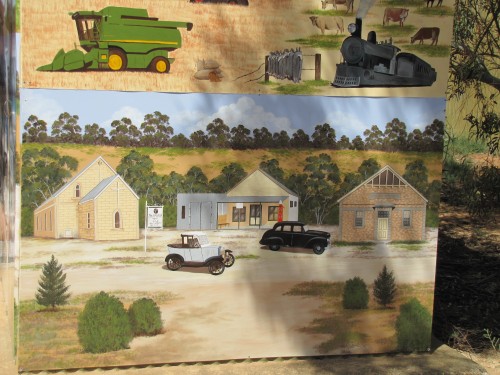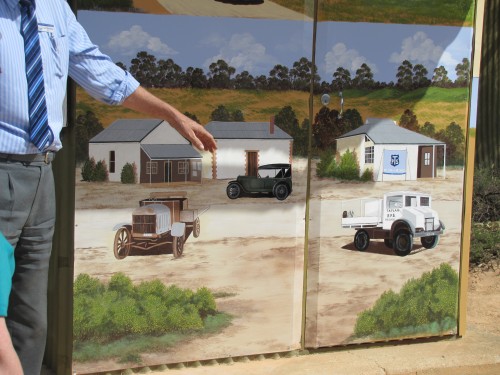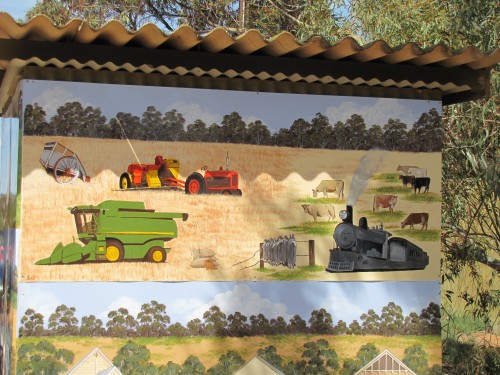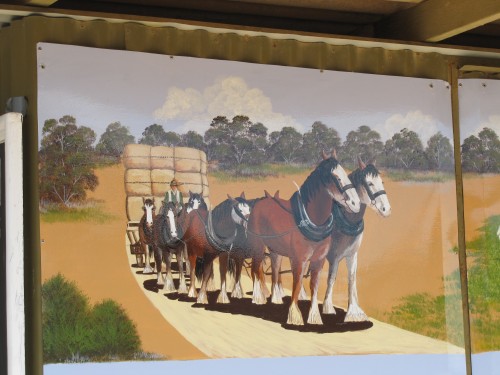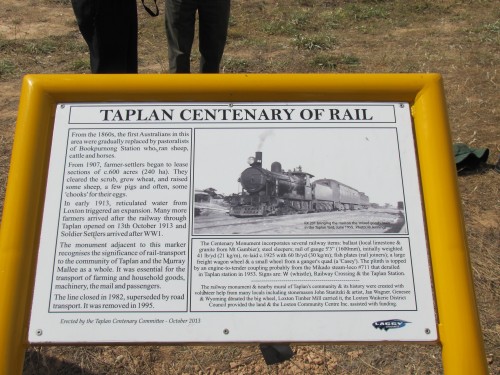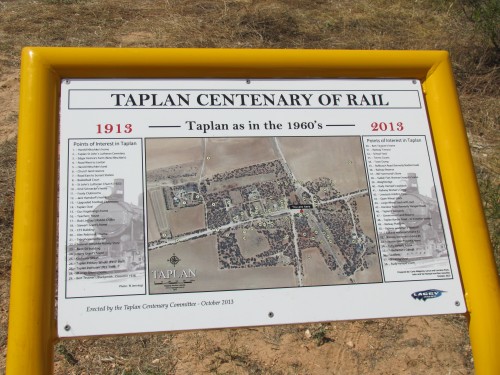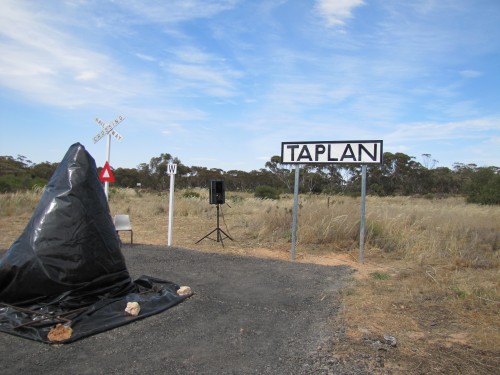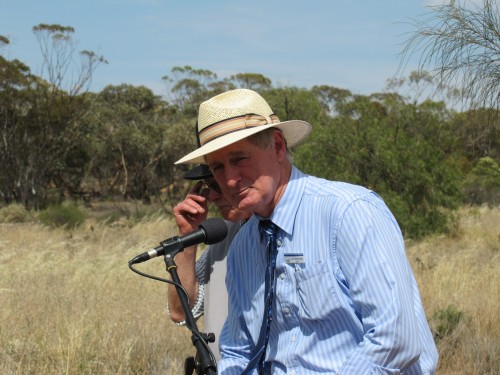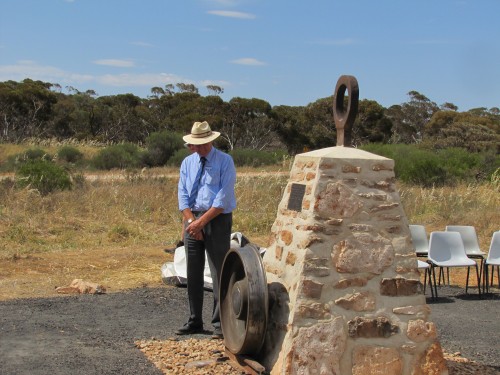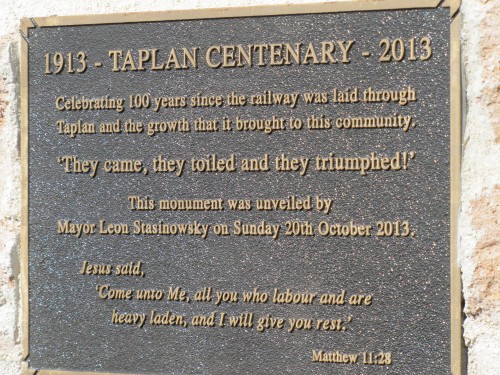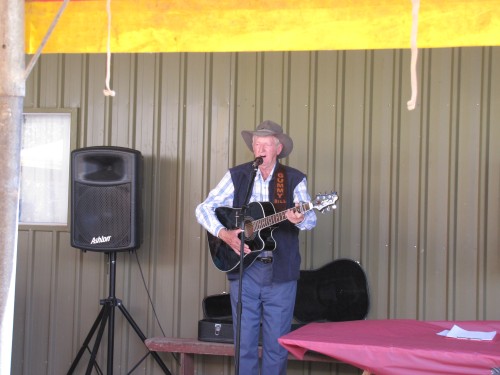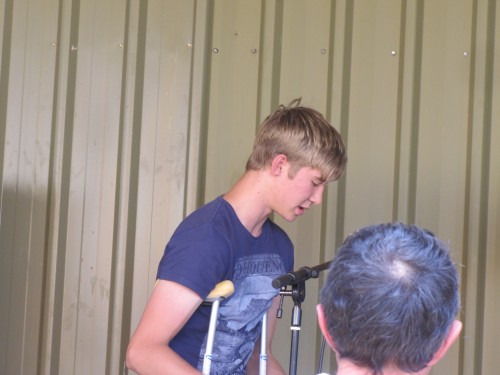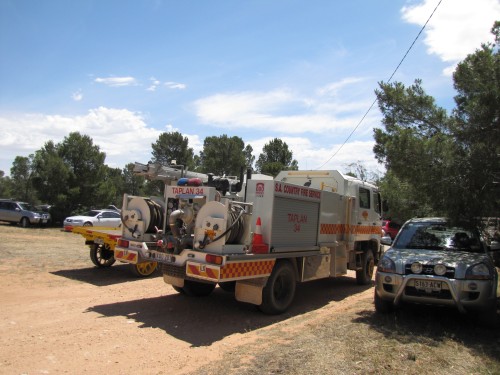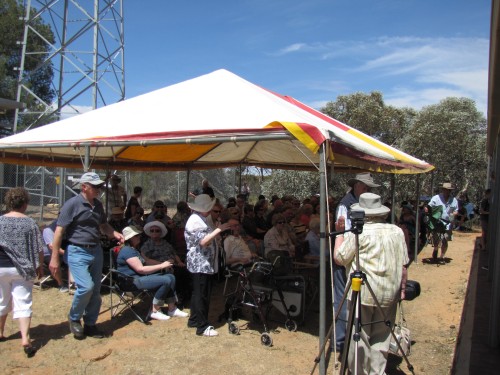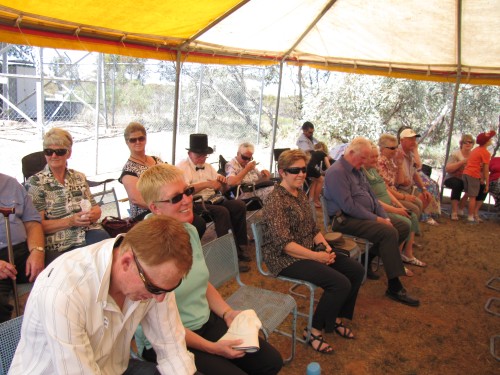Taplan mural paintings
As a part of the Taplan Railway Centenary celebrations in 2013 there was special mention made of the new murals painted on the telephone exchange building. This small structure, shown in today’s series of photos taken on the day, replaced the old manual telephone exchange in the nearby post office many years ago. This building also doubles as a mail centre, the letters being sorted regularly into a handful of post office boxes in the side of it.
When I was growing up in the 1950s and 60s I would walk past this spot twice every day on my way to and from school a few hundred metres away. Behind this modern structure is the old post office where I would stop every day on my way home to collect the mail from a window, behind which the post master sat. His job every day would be to sort the few dozen letters addressed to residents in the area. He also manned the manual telephone exchange, connecting incoming calls to the number being called.
The phones in the homes of the district were typical of many used throughout rural Australia of that era. A bulky wooden cabinet hung on the wall in our dining room, with a large mouthpiece and a cord attached to an earpiece. When there was an incoming call, the phone would ring loudly and to answer one picked up the ear piece from its cradle and spoke into the mouthpiece. The person manning the exchange then connected the caller. To make a call one would pick up the earpiece and turn a handle, alerting the person in the exchange that you wanted to make a call, which they then connected for you. My parents would be astounded by the modern mobile phone and the many things one can do on one.
In the photos below I have show the new murals from different angles. One photo shows the artist and the Mayor of Loxton Waikerie who declared the murals open. The paintings, based on local scenes and local farming equipment down through the years, show typical scenarios of life in the Taplan region.
Taplan Railway Centenary Celebrations part 6
This interpretive sign was placed in position near the plaque celebrating the centenary of the opening of the railway line through Taplan, south east of Loxton in eastern South Australia. (Click to enlarge the image.)
The Taplan area in the Murray Mallee region of my state is a predominantly cereal growing area, supplemented by sheep and cattle. The opening of the railway line in 1913 accelerated the growth of the town and the surrounding farms. Its introduction meant quick access to markets for the products produced, as well as easy transport of farming supplies needed.
When I was growing up on my father’s farm in the 1950s and 60s, the town was still a busy community. Every day on my way to school and home again I would walk past this very spot where these signs now stand. The school was a one room, one teacher rural school with about 30 children attending. It closed many years ago and the few children left in the community now go to school in Loxton by bus.
The interpretive sign shown in the photo below shows an aerial photo of Taplan taken in the 1960s. It shows my father’s farm homestead in the lower right hand corner of the photo. Our farm is shown as the cleared land in the lower part of the photo – of course, this was only a small portion of the whole farm which stretched several miles in either direction east and west of the town, and about a mile to the south, some 2000 acres in all.
Taplan Railway Centenary Celebrations part 5
After all of the speeches the visitors to the Taplan Railway Centenary celebrations moved down the main street to near the old Post Office. Here a special memorial plaque and historic monument had been set up as well as some signs.
The signs in the photo above show (from the left):
- the Railway Crossing warning sign for the road crossing
- the W sign indicating to the train driver to blow the train’s whistle as he approached the crossing
- the Taplan station sign.
All of these have been relocated from their original positions so that they can be near the displays and memorial. The official unveiling and opening was performed by Mayor Leon Stasinowsky (below) on the 20th October 2013.
Taplan Railway Centenary Celebrations part 4
Over recent days I have been writing about the Taplan Railway Centenary celebrations held last October. Before the speakers came to give their presentation, the gentleman shown above entertained the gathered crowd with a few appropriate songs he had written about the locale. He is a current resident of the town and well known for his songs.
After the official welcome each of the founding families had a representative come to the microphone to give a short presentation about their place in the history of the Taplan district, south east of Loxton in South Australia. The first settlers came in the late 1800s, but it was not until the water pipeline and the railway line were built in 1913 that the town really flourished. I went to the local school in the 1950s. It is no longer open.
All of the people doing a presentation related events in their family history, each one presenting it like a diary entry written by their ancestor. It was very effective way of presenting history. One of the presenters was my great nephew Lochie who told about the struggles of my father (his great grandfather) and his grandfather (my brother). Lochie’s father now farms the family land and he is quickly learning the ropes too. His hands-on approach, even as a teenager, is already proving invaluable in the daily running of the property.
His great grandfather would be utterly amazed at the scale of farming being undertaken today, and the vast array and size of machinery now utilised in this district.
Taplan Railway Centenary Celebrations part 3
Last October my wife and I attended the Taplan Centenary celebrations. Taplan is a small farming community south east of Loxton and close to the Victorian border in the Murray Mallee region of South Australia. I grew up on my father’s wheat and sheep farm near the town and attended the local primary school from 1954 to 1960. Last October marked 100 years since the establishment of the railway line from Tailem Bend to Renmark.
At the same time reticulated water reached the town from the River Murray at Loxton. These two factors alone gave a struggling community an amazing boost. Now longer was it required to cart water from the river – some 30km away – but goods such as wheat, wool and animals could be easily transported to market. Many other items such as mail could now be delivered daily by train, along with many other necessities.
During the formal part of the proceedings the large crowd were kept relatively comfortable in the hot conditions under a marquee erected just outside the Country Fire Service (CFS) shed in the main street. Before the speeches and presentations, visitors and locals were able to inspect the vast array of memorabilia and photographic displays inside the shed. All major families of the district were represented in this interesting display.
I will show more photos tomorrow.
